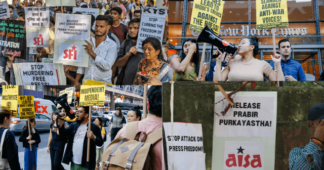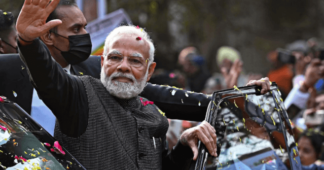This is horrifying—a clear case of political persecution by an authoritarian government,” one of Roy’s publishers wrote.
By Olivia Rosane
Jun 16, 2024
Delhi Lieutenant Gov. V. K. Saxena has sanctioned the prosecution of world-renowned Indian author and activist Arundhati Roy over comments she allegedly made 14 years ago regarding Kashmir, officials from his office said on Friday.
Saxena is a member of Indian Prime Minister Narendra Modi’s ruling Bhartiya Janata Party (BJP), and Roy has been a vocal critic of Modi and what she has described as India’s “descent… into full-blown fascism” under BJP leadership.
“This is horrifying—a clear case of political persecution by an authoritarian government” Seven Stories Press, which publishes Roy’s work, wrote on social media in response to the news.
Along with Roy, Saxena also sanctioned the prosecution of former Central University of Kashmir international law professor Sheikh Showkat Hussain. The charges originate from a conference the two attended in New Delhi titled “Azadi: The Only Way” on October 21, 2010, according to Indian media.
During the conference, Roy allegedly said that Kashmir—a disputed territory that is administered partly by Pakistan and partly by India, and where the Indian occupation has committed human rights abuses—”has never been an integral part of India.”
On October 28, 2010, a first information report (FIR) naming Roy, Hussain, and other co-defendants who have since died was registered in the New Delhi’s Court of Metropolitan Magistrate. A FIR is a document that law-enforcement officials file after receiving actionable information about a potential offense.
“The issues discussed and spoken about at the conference propagated the ‘separation of Kashmir from India,'” the governor’s office said.
Friday’s sanction allows the prosecution of Roy and Hussain under a part of India’s controversial Unlawful Activities (Prevention) Act (UAPA) related to sedition. It follows Saxena’s decision in October of last year to allow the case to move forward under different sections of the Indian Penal Code.
As the Independent explained:
“The UAPA allows the authorities to detain suspects for up to 180 days without any charges. It was tweaked by the Modi administration in 2019 so that individuals could be classified as terrorists without necessarily being linked to a designated terror group. A total of 1,948 people were arrested in 2019 after the change came into force, marking an uptick of almost 37% from the previous year.”
The new development comes a little more than a week after Modi’s BJP failed to win a majority in India’s elections for the first time since 2014. While Modi retained control of the government through his coalition partners, the better-than-expected performance of the opposition was widely seen as a setback for the right-wing leader, and some critics thought the election results and the prosecution of Roy might be related.
“If by prosecuting Arundhati Roy under UAPA the BJP are trying to prove they’re back, well they’re not. And they’ll never be back the same way they were,” member of parliament Mahua Moitra from the opposition Trinamool Congress Party said, adding, “This kind of fascism is exactly what Indians have voted against.”
Other Indian opposition politicians spoke out against the targeting of Roy.
The Communist Party of India (Marxist) said the move was “condemnable” and that prosecuting Roy for a speech made 14 years ago “defies logic except the fascist kind,” as The Guardian reported.
“Timing is suspect since courts are on vacation, as are lawyers,” the party added.
Communist Party of India leader D. Raja also said that the “timing is highly questionable” and added that “it appears to be a political vendetta.”
Several well-known authors and activists expressed solidarity with the 62-year-old Roy, who won the Booker Prize in 1997 for her novel The God of Small Things.
“Solidarity with Arundhati Roy,” author Hari Kunzru posted on social media. “Modi has been out to get her since the days when she spoke out about his complicity in the 2002 Gujarat riots. She once told me a terrifying story about having to escape via the roof of an Ahmedabad guesthouse when police came to question her.”
Author Amitav Ghosh said: “The hounding of Arundhati Roy is absolutely unconscionable. She is a great writer and has a right to her opinion. There needs to be an international outcry about the case that has been brought against her for something she said a decade ago.”
Poet Zeeshan Joonam wrote: “The attempt to silence the legendary writer Arundhati Roy from India must be condemned by all free speech advocates. She has done nothing wrong. She is an intellectual and moral giant.”
Former Greek Finance Minister and leader of the pan-European leftist political party DiEM25 Yanis Varoufakis, meanwhile, issued a challenge to the international community.
“Only yesterday I was expressing concern over the rumors that Arundhati Roy might be Modi’s next political prisoner. A day later the rumor is becoming a reality,” Varoufakis posted on social media. “Will there be an uproar in the ‘civilized’ West? Or will complicity be the order of the day a la Assange?”
We remind our readers that publication of articles on our site does not mean that we agree with what is written. Our policy is to publish anything which we consider of interest, so as to assist our readers in forming their opinions. Sometimes we even publish articles with which we totally disagree, since we believe it is important for our readers to be informed on as wide a spectrum of views as possible.











